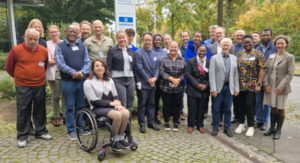Organised by the project “Forced Migration and Refugee Studies: Networking and Knowledge Transfer (FFVT)” and the German Commission for UNESCO, the workshop “Equitable International Research Cooperation” took place on 23 and 24 October 2023 in Bonn.
“International research cooperation should be equitable”. That sounds like a truism of every government research strategy. However, in real life, research cooperation is often far from meeting that aspiration. Discussions about how to actually make international research cooperation equitable have been on the rise in recent years. To focus on this issue, IDOS and its team working on the project “Forced Migration and Refugee Studies: Networking and Knowledge Transfer (FFVT)” has teamed up with the German Commission for UNESCO (DUK) to host the workshop “Equitable International Research Cooperation: From Affirmations to Practice” in Bonn. International experts from academia, research funding organisations and the science-policy interface, coming from different regions of the world and scientific disciplines, discussed what structural and social barriers have to be overcome to advance equitable international research cooperation.
Prof. Anna-Katharina Hornidge, who is both director of IDOS and chair of the Science Expert Committee of DUK, and Dr Lutz Möller, Deputy Secretary General of DUK, welcomed the participants and presented DUK’s ongoing work to improve the framework conditions for equitable international research cooperation.
Based on a draft position paper by DUK’s Science Expert Committee, the participants discussed challenges and possible solutions for equitable international research cooperation to make such structures more equal, from agenda-setting to impact monitoring. The discussions showed: Integrating diverse perspectives, including non-scientific expertise, has the potential to significantly improve the quality of research and the relevance of its outcomes in many scientific fields. Therefore, trust-building, long-term cooperation and easy access to data for all researchers are crucial. Additionally, Merlin Flaig and Dr Jana Kuhnt from IDOS presented the FFVT project and IDOS’ approaches to research cooperation. The input sparked discussions on challenges of authorship in research, project agenda setting as well as the lack of visibility of local research.
The second day of the workshop focused on how to better design research funding lines and (inter-) national strategies on research, as well as how to improve practical research processes. Participants discussed ideas for more inclusiveness and equitability. Core issues addressed concerned the need for more flexibility in project terms and especially funding, the need for mentoring programs for scholars, as well as carefully chosen approaches to, inter alia, open access publication and science practice to confront and reduce asymmetries.
The open, critical and constructive discussions during the workshop served as a vital push for many participants to further pursue more equitable practices and structures in international research cooperation. In a next step, the DUK’s Science Expert Committee will discuss how to include the insights from the workshop into its draft position paper on equitable partnerships and will discuss the issues raised during the workshop. The position paper will then be updated accordingly and is expected to be published in spring 2024 to, in a first step, inform and initiate a domestic debate in Germany and, in a second step, to bring the issue to the international policy level.

